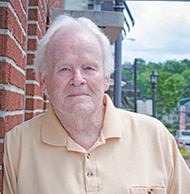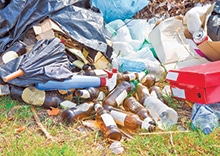
The owner of the flying service held a pole with a nail on end. He was going along the dock shoving the pole down to the bottom to stab aluminum cans. He had filled a container. The water was clear. I saw more cans on the bottom.
There was a large sign on the wharf that directed people to put their cans in a container.
“Why are so many cans down there,” I asked.
“People who fish apparently can’t read,” he said.
“How often do you do this?” I asked.
“During summer I have to do it often. I hire boys to dive for the beer bottles. It seems like nobody cares about the environment anymore.”
“We’ve got a lot of folks who clutter back home.”
“Years from now archeologist will dig for artifacts from this century. They will uncover all this trash. They’ll report that Pigs Erectus once lived here.”

The littering continued up Lawrenceville Suwannee Road and on to Hurricane Shoals. Traffic was heavy on High Point, so I turned on 316 and noticed pieces of scrap paper being swirled along by speeding semi-trucks. A can was tossed out of a speeding truck.
Leaving a strip center on Collins Hill Road my wife and me were astonished by the discarded pieces of paper in a wooded area adjacent to the parking lot.
I remember years ago seeing an omen in a magazine showing an Indian in full regalia walking beside a waterway with tears on his cheeks. He was looking at floating trash.
Indigenous Natives nurtured this land for 14,000 thousand years before the arrival of contaminators.
Ornithologists opened up the carcasses of several sea birds and grazers. They found plastic pieces in their digestive systems, indicating they died from the discards that had been carelessly tossed in their domain.
The Canadian was probably correct about what archeologists will discover in the future unearthing the garbage people we will have discarded.
Bill is a WW II Navy veteran and retired President of York Furs in Buckhead. You can contact him by email at Sioux2222@gmail.com

